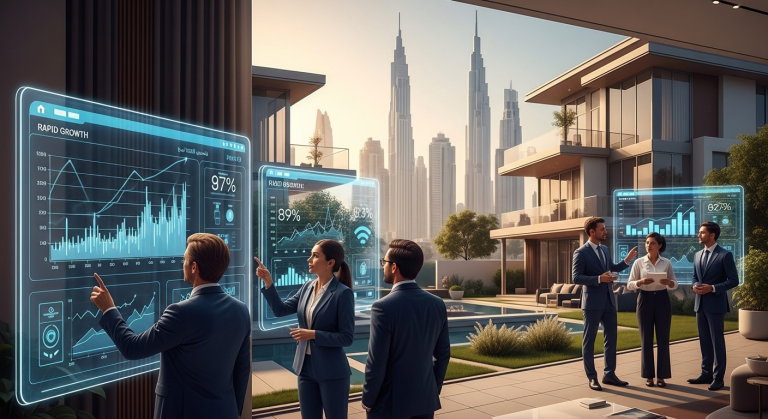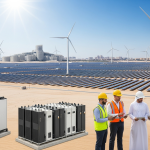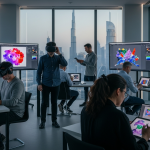Market Analysis and Opportunities
Smart home installation services are at the forefront of digital transformation in the UAE, particularly in Dubai—a city celebrated for its world-class infrastructure and technological ambition. As smart cities become integral to the UAE’s vision, understanding the market dynamics of smart home solutions is essential for entrepreneurs and investors seeking business opportunities in Dubai.
Target Market Analysis
The smart home industry in the UAE is experiencing rapid growth. According to Statista, the UAE smart home market is projected to reach over USD 411 million by 2024, with a compound annual growth rate (CAGR) exceeding 15% through 2027. Dubai leads the demand, driven by high disposable income, a tech-savvy population, and a government steadfast in making the city a beacon of innovation.
– Primary customers: High-income homeowners, property developers, real estate investors, luxury apartment complexes.
– Secondary customers: Commercial buildings, hospitality sector (hotels adopting smart room controls), SMEs enhancing workplace efficiency.
Consumer preferences are evolving towards convenience, energy efficiency, security, and a luxurious lifestyle. The most in-demand features are:
– Home automation controls (lighting, HVAC, curtains, appliances)
– Security systems (smart CCTV, alarms, access control)
– Energy-saving solutions (smart thermostats, automated energy management)
– Entertainment integration (multi-room audio, voice assistants)
Digital transformation and sustainability are key industry trends:
– Government-led sustainability initiatives, such as Dubai’s Clean Energy Strategy 2050, are spurring interest in eco-friendly smart systems.
– The EXPO 2020 legacy and tourism boom strengthen Dubai’s appeal as a testbed for innovative living solutions.
Marketing Needs
With competition on the rise, establishing a strong market presence requires:
– In-depth market research to identify niche segments (e.g., affordable smart solutions vs. high-end integrations)
– Targeted digital marketing campaigns: SEO-optimized website content, Google PPC ads, social media engagement, and content marketing.
– Brand partnerships with real estate developers and interior designers to secure B2B contracts.
– Participation in expos and industry events, leveraging Dubai’s vibrant networking scene.
Actionable recommendation: Invest in multichannel marketing, using social media influencers, Google AdWords, and in-person product demos. Build credibility through case studies and customer reviews, leveraging platforms such as the Persian Horizon blog for thought leadership and SEO reach.
Expansion Potential
The smart home sector in Dubai offers several scalable opportunities:
– Penetrate untapped segments, like affordable housing developments or retrofitting older properties.
– Target high-growth neighboring cities (e.g., Abu Dhabi, Sharjah) and expand into the wider Gulf Cooperation Council (GCC) region.
– Diversify services: Transition from only B2C to B2B channels, or offer after-sales maintenance, subscription upgrades, and training.
– Explore export potential by developing proprietary smart devices or control software for international markets.
Comprehensive Business Overview
Smart home installation services encompass the provision, integration, and maintenance of intelligent building solutions for residential and commercial clients. This industry includes security systems, automated lighting, HVAC control, smart appliances, and IoT connectivity—delivering seamless, modern living experiences.
Business Model
Most providers operate on a turnkey or project-based model—offering end-to-end consulting, product sourcing, bespoke integration, installation, and ongoing support. Key revenue streams include:
– One-time project fees
– Monthly/annual maintenance contracts
– Sale of smart products and accessories
– Subscription-based software services
Target Audience
– Homeowners (luxury villas, apartments)
– Property developers and construction firms
– Hospitality (hotels, serviced apartments)
– Commercial offices and co-working spaces
Operational Scope in UAE
Dubai is ideal for smart home startups and established players alike. Setting up in locations such as Dubai Internet City Free Zone or Dubai Mainland offers access to top-tier clients, skilled talent, and advanced digital infrastructure.
Mission, Vision, and Objectives
– Mission: To elevate quality of life and sustainability in Dubai’s homes and businesses through cutting-edge smart technologies.
– Vision: To be Dubai’s leading brand for innovative, reliable, and eco-friendly smart home solutions by 2030.
– Core Objectives:
– Deliver world-class customer satisfaction
– Pioneer eco-friendly solutions
– Drive digital transformation in the UAE’s residential sector
Stage and Location
Most new entrants are at the startup or early growth stage, with rapid scale opportunity due to expanding market demand. Dubai Free Zones (e.g., DIC or DTE) offer streamlined licensing, 100% foreign ownership, and modern facilities.
Competitive Advantage
Entrepreneur Perspective
– High-growth market with strong demand from both residents and businesses.
– Early mover advantage by establishing brand presence before full market saturation.
– Flexible business models allow for rapid pivoting and innovation.
Investor Perspective
– Attractive ROI, driven by high-value contract sizes (luxury projects often exceed AED 100,000 per installation).
– Strong government support for smart city and green building initiatives.
– Opportunity to back companies with proprietary technology or exclusive international partnerships.
Example: Partnerships with major technology brands (e.g., Google, Amazon, Samsung SmartThings) can differentiate providers and increase customer trust.
Manager Perspective
– Highly skilled, multicultural workforce available in Dubai’s tech ecosystem.
– Strategic location in Dubai ensures excellent logistics, global supply chain access, and strong B2B opportunities.
– Effective management can streamline operations via cloud-based project management tools and data analytics for recurring revenue.
Financial and Investment Needs
Financial Requirements
Capital investment varies by scale but is generally moderate to high for:
– Company formation: AED 20,000–50,000 (Free Zone setup)
– Technology inventory and demo setups: AED 100,000–300,000
– Office space (co-working or dedicated): AED 50,000–150,000 annually
– Staffing and salaries: AED 350,000–600,000/year for a core team of 5–8 technical and sales staff
– Marketing and branding: AED 50,000–100,000 launch budget
– R&D or exclusive tech partnerships: AED 100,000+
Investment Potential
For investors, smart home installation services stand out due to their scalability, high recurring revenue from maintenance, and alignment with Dubai’s smart city vision. Investment models could include:
– Equity partnership for rapid scaling
– Venture capital for startups with proprietary tech
– Debt or revenue-sharing for established firms seeking market expansion
Financial Risks and Mitigation
Key risks include:
– Cash flow strain due to project-based revenue
– Price competition lowering margins
– Currency fluctuations for imported tech components
Risk mitigation strategies:
– Foster multiple revenue streams (e.g., AMC, product sales)
– Maintain robust financial controls and cash flow forecasting
– Diversify supplier base and negotiate hedging instruments where possible
For tailored investment advice in the UAE, explore investment consulting services from Persian Horizon.
Human Resources and Recruitment
Workforce Needs
A typical smart home installation business requires:
– Project managers and customer support (2–3)
– Skilled installation technicians and engineers (3–5)
– Software specialists for integration and maintenance (1–2)
– Marketing and sales professionals (2–3)
Critical skills include IoT configuration, systems integration, wiring and networking, cyber security, and local product compliance.
HR Challenges
The UAE faces a competitive labor market for tech roles. Challenges include:
– Scarcity of experienced IoT specialists and system integrators
– Employee retention due to regional demand
– Need for upskilling with the pace of technology evolution
Mitigation:
– Offer competitive salaries and visa sponsorship
– Invest in employee training and certifications
– Implement incentive structures (performance bonuses, growth pathways)
Compliance with UAE Labor Laws
Strict adherence is required for:
– Employee contracts (clearly defining duties and compensation)
– Visa processing for expatriate staff
– Compliance with Emiratisation quotas where applicable
– End-of-service benefits and health insurance
Action point: Consult with local HR advisors or explore business setup services to ensure legal compliance.
Infrastructure and Operations
Infrastructure Needs
Requirement highlights:
– Flexible office solutions: Start with co-working spaces or virtual offices to control costs before moving to a permanent location
– Demo centers for client walkthroughs
– Fleet vehicles or logistics partners for on-site installations
– Investment in digital tools: Cloud-based CRM, ERP, remote monitoring platforms
Operational Optimization
Challenges:
– Installation delays from global supply chain disruptions
– Manual processes slowing project delivery
Improvements:
– Implement ERP systems for real-time project and inventory tracking
– Streamline supplier relationships and stock locally where possible
– Adopt lean workflow processes and automate scheduling
Legal Compliance
Company registration, licensing, and bank accounts must align with Dubai Department of Economic Development (DED) or relevant Free Zone authorities. Ensure:
– Proper activity licensing (technology services, contracting)
– Health and safety compliance for field technicians
– Timely renewal of trade licenses and regulatory approvals
Consult experts in business sales services for comprehensive compliance solutions.
Innovation and Technology
Leverage:
– IoT platforms for monitoring and diagnostics
– AI-powered predictive maintenance solutions
– White-labeled mobile apps for customer engagement
Recommendations:
– Stay current with emerging home automation protocols
– Explore partnerships with local universities for R&D
– Use analytics to personalize upgrades and cross-sell opportunities
Marketing and Branding Strategies
Brand Status
Brand perception is vital in the competitive Dubai market. Strong brands:
– Showcase client testimonials and completed high-profile projects
– Exhibit at innovation hubs and real estate expos
– Develop clear, premium visual identity and messaging
For improvement:
– Invest in a dynamic online presence with SEO-rich content and customer support
– Expand thought leadership through content marketing and press releases on platforms like the Persian Horizon news feed
Marketing Channels
Current best practices include:
– Digital: SEO, Google Ads, Instagram, LinkedIn, Facebook targeting homeowners and businesses
– Traditional: On-site demos, event sponsorships, partnerships with malls or property developers
Enhance by:
– Segmenting campaigns for expat vs. local audiences
– Localizing content in English and Arabic
360-Degree Campaigns
Opportunities include:
– Multi-channel strategies across web, social, events, and print—the “work smarter, live better” narrative
– Email nurturing campaigns for B2B clients
– Limited-time offers tied to local holidays or real estate launches
Example: Feature collaborations with sustainability initiatives to attract eco-conscious buyers.
Growth and Development Potential
Growth Strategies
– Market expansion via tie-ups with leading property developers or hotels
– Cross-selling adjacent services (security upgrades, office automation)
– Leveraging government grants and smart city pilot projects
Networking
Dubai’s ecosystem offers unmatched networking via trade shows, industry forums, and business councils. Companies should:
– Join organizations like Dubai Chamber of Commerce
– Seek collaboration with international firms wising to tap the UAE market
Visit Persian Horizon for access to a 57-country partner network: Persian Horizon.
International Potential
Dubai’s status as a global business gateway enables exporting smart home expertise and technology across MENA, Asia, and Europe. Promoting Dubai as a reference site for innovation bolsters international expansion and partnerships.
Sustainability and Innovation
Alignment with Dubai Vision 2030 and the UAE’s Net Zero 2050 strategy is imperative. Recommendations:
– Incorporate automation technologies that prioritize energy efficiency (solar panel integration, AI-based energy management)
– Use eco-friendly materials and packaging
– Develop recycling programs for hardware at end-of-life
Alignment with Dubai’s Market
Cultural Alignment
Dubai’s multicultural landscape offers diversity but requires cultural sensitivity. Tailor marketing and user interfaces in multiple languages, and offer customer support aligned with regional customs and expectations.
Local Regulatory Compliance
Strict adherence to commercial, tax, and labor regulations is non-negotiable. Utilize professional service providers and stay up to date on new data privacy and product certification laws. Any gaps must be urgently addressed to avoid penalties or license revocation.
Advantages of Dubai
Smart home businesses leverage:
– Zero personal or corporate taxes in many Free Zones
– Proximity to premium clients and key decision-makers
– Robust logistics and import-export infrastructure
– High smartphone and broadband penetration
Example: Free Zone businesses enjoy rapid setup, full foreign ownership, and streamlined customs clearance—minimizing cost and time-to-market.
Local Challenges
Obstacles include:
– High operational costs (rent, skilled labor)
– Fierce competition from regional and international players
Solutions:
– Start in co-working or virtual offices to reduce initial outlay
– Differentiate through unique solutions or service excellence
– Carefully benchmark pricing and optimize cost structures for sustainability
For assistance with business buying, setup, or advertising, explore sales and advertising services by Persian Horizon.
Conclusion
Smart home installation services represent one of the most promising business opportunities in Dubai, aligning with the emirate’s smart city vision, high consumer demand, and focus on sustainability. While financial, talent, and operational risks exist, they can be effectively managed through robust planning, local partnerships, and ongoing innovation.
Investors are attracted by strong ROI potential, scalability, and recurring revenue streams. Managers enjoy operational benefits from Dubai’s infrastructure, while entrepreneurs benefit from a rapidly evolving, innovation-focused market. Success hinges on regulatory compliance, market-driven branding, and continuous adaptation to emerging technology trends.
Call-to-Action
To launch, grow, or invest in smart home installation services in Dubai, leverage the local knowledge and strategic networks offered by Persian Horizon. For business setup, legal compliance, investment consulting, and cross-border expansion services, visit the Persian Horizon services page and discover how expert guidance can maximize your business opportunity in the UAE.







